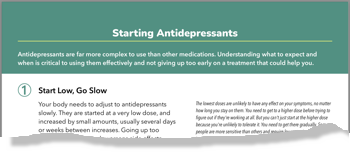Starting Antidepressants
Dec 07, 2023
Antidepressants are far more complex to use than other medications. Understanding what to expect and when is critical to using them effectively and not giving up too early on a treatment that could help you.
1. Start Low, Go Slow
Your body must slowly adjust to antidepressants. They are started at a very low dose, and increased by small amounts over several days or weeks. Going up too quickly or by too much worsens side effects.
The lowest doses are unlikely to have any effect on your symptoms, no matter how long you stay on them. You need to get to a higher dose before trying to figure out if they're working at all. But you can't just start at the higher dose because you're unlikely to tolerate them. You need to get there gradually. Some people are more sensitive than others and require lower starting doses and increments, or more time between each increase.
2. Expect Side Effects; Most Are Temporary
When you first start and at each dose increase, you're likely to experience side effects. Common ones include headache, nausea, dizziness, feeling wired, insomnia, fatigue, brain fog, and more.
Don't freak out! This is your body adjusting to the medication. Most side effects peak within 5–10 days and then decrease. So wait. Wait some more. Then wait some more.
Don't wait if you experience a severe allergy, problems breathing, a large drop in blood pressure, or severe pain. Read the medication leaflet for other medication-specific concerns. For these, seek help or call your prescriber.
If side effects haven't started to improve after a couple weeks (or stop improving), talk to your prescriber. They may suggest ways to manage or workaround the side effect, or try a different medication altogether. Just because you had a side effect on one doesn't mean you'll have it on another. And just because a medication MAY cause a side effect doesn't mean it WILL.
3. Give Them Time to Work
The length of time varies, but generally it will take up to eight weeks at a given dose of a particular medication to determine how well it is working.
It's common for other people to notice improvements in your mood or anxiety before you do. As well, different symptoms improve at different rates. Some, including cognitive symptoms, may take much longer.
4. Followup With Your Prescriber
Professional followup is necessary to assess tolerance and effect, and adjust accordingly.
It's important to follow your prescriber's instructions closely and be honest about anything you're experiencing. Don't make adjustments on your own.
Bottom Line: Antidepressants can be very effective medications, but only if used properly—which isn't easy! There is some trial and error to find the right one for you. And medications are usually only one piece of the puzzle when it comes to mental health treatment.
 Printable Tip Sheet
Printable Tip Sheet
Download



